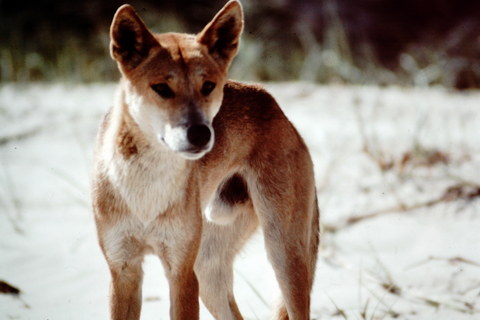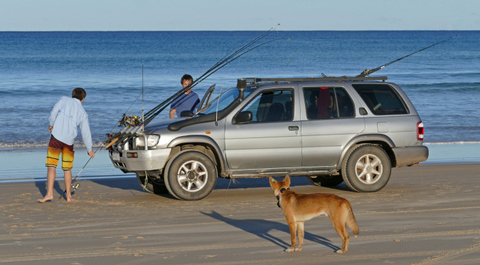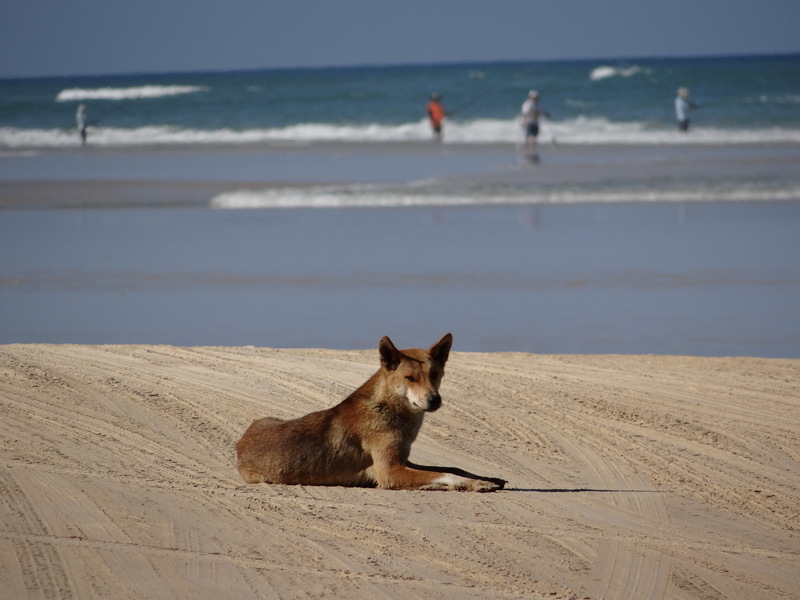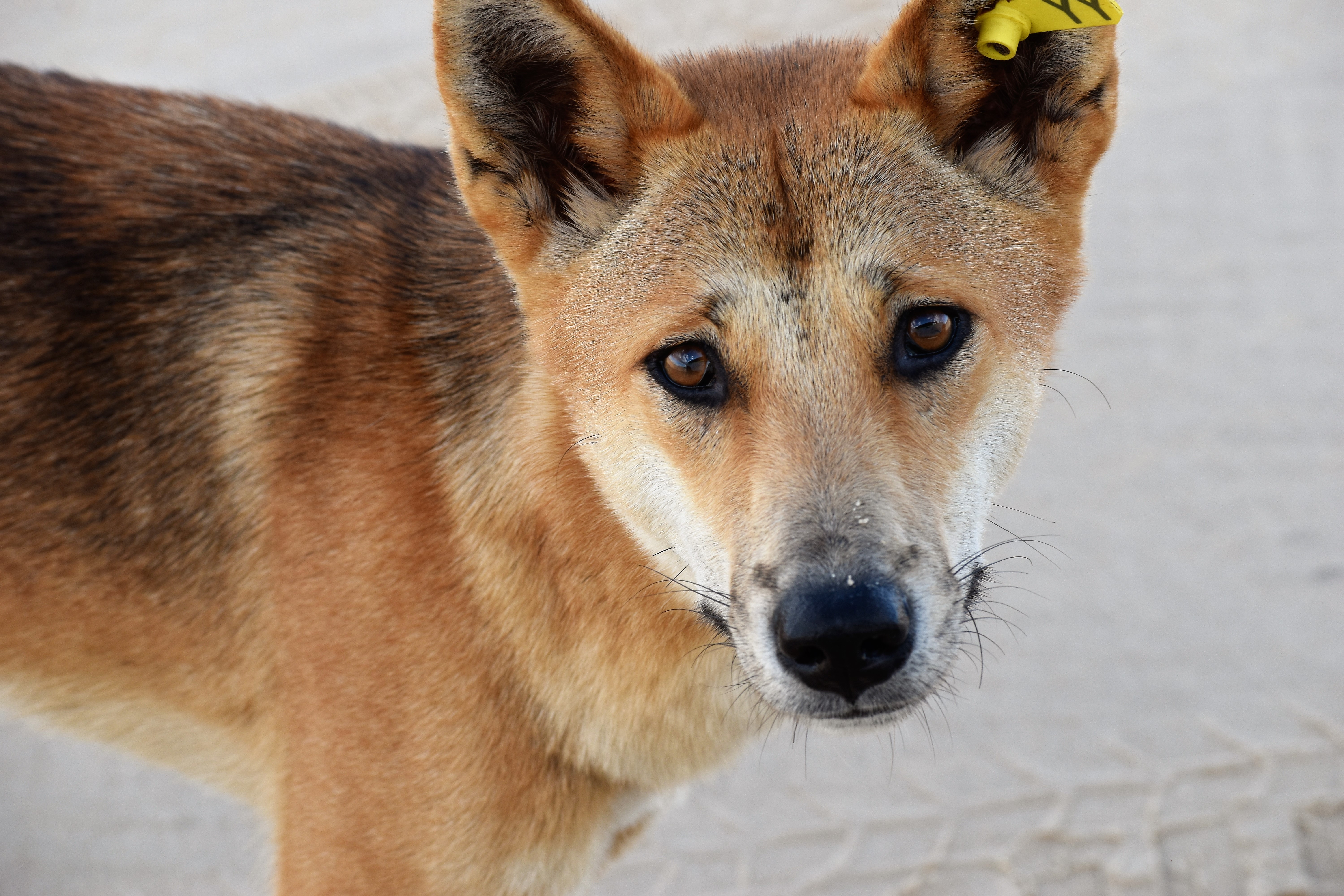
Dingo safety
OVERVIEW
Never feed dingoes and keep your distance from these iconic Island creatures.
Everyone who visits, works or lives on K’gari can help protect dingoes and stay safe by following dingo safety advice.
Dingoes are wild animals and dont obey commands from people. They are not like domestic dogs. Once a dingo starts to lose its wariness of people, its behaviour can quickly lead to trouble for people and the dingo.
Report all dingo incidents
Whether negative or positive report all incidents by phone (07) 4127 9150 or email: dingo.ranger@des.qld.gov.au
For emergency medical help: phone Triple Zero (000)
Queensland Parks and Wildlife Service advice
- Do not run if dingoes come close. Dingoes are curious, they do not always want to attack you. Running away excites them and they may try to catch you. This can lead to bites, especially to the back of your legs.
- Stay calm, stand to your full height and face dingoes if they come close. If you are with others, stand back to back. Maintain eye contact and confidently and loudly call for help. Calmly move away from the dingo to a safe area, preferably a vehicle or fenced area. Do not run or wave your arms or feet at them.
- Do not go for a run or jog outside the fenced areas. Jogging and running stimulates dingoes chasing instincts and once one starts to chase you, others may follow.
- Never feed dingoes or leave food lying around. Penalties apply even inside a fenced area.
- Keep your distance.
- Photograph dingoes from afar or stay in your car. Never try to attract dingoes to come close.
- When you walk, walk in groups. Walk together, stay alert and carry a stick or umbrella for extra protection.
- When nature calls, never go alone. Toilets are provided across the Island. Avoid bush toileting unless absolutely necessary.
- When youre leaving a fenced area, close the gate. Think safety! Use the pedestrian gates and never walk over the car grids. Ensure gates are closed after you leave and never prop gates open.
Children
- Always stay within arms reach of children, including small teenagers.
- Never let children sleep in a tent or camper trailer without adults.
- Never let children wander away on tracks, lakes and beaches.
- It's wise to stay in fenced camped areas with children.
Accommodation
- Keep house doors and low windows secure.
- Lock screen doors. Some dingoes have learnt how to open simple door latches.
- Choose fenced accommodation
Driving
- Stay alert for dingoes, slow down and if safe stop to let dingoes get out of your way. Dingoes are protected by law and roam freely on the Island. Their movements are unpredictable. Don't drive dingoes down. Penalties apply.
Visiting lakes
- Take no food or drinks (except water) to lake shores. Sitting down to a picnic on the shore of a lake or the beach puts you and food at 'dingo level'.
Fishing and camping
- Keep all fishing gear, bait, berley and catch that youre not using in a closed vehicle. Watch your back! Dingoes can appear at any time.
- Keep food (and rubbish) containers firmly strapped. Dingoes are always on the prowl for food and will chew through or tear into anythingunsecured iceboxes, tents, thin plastic boxes, plastic bagswhen following the scent of food. Secure storage and iceboxes with heavy-duty straps. Dingoes are enticed by anything with a food scentdish cloths, wine casks, toothpaste, even unopened canned food and drinks. Make camp sites boring for dingoes. Tent walls are no protection from dingoes if they are following a food scent. You should never eat or store food goods in tents.
- Bury your fish scraps in a deep hole. Bury foodjust below the high tide mark, so theres at least 50cm of sand above the top of the scrap pile to the lip of the hole. Do this when dingoes arent around so they dont associate people with food.
- Cleaning fish in camp sites is not permitted.
- Do not hang bait or berley bags on the outside of vehicles, in trees or leave lying around.
- Do not throw any fish or fish remains and bait to dingoes or other wildlife.
- Keep tidy bulk bins for campers rubbish in fenced waste transfer stations along the eastern beach. Loose rubbish can fly about and end up in the ocean, as well as attracting dingoes and other wildlife.
- If you need to go to the toilet in the bush, never go alone; especially at night! Have someone, standing a little way off keeping a look out for dingoes. To bush toilet, dig a hole at least 50cm deep and when finished, cover your waste and the used paper immediately afterwards.


